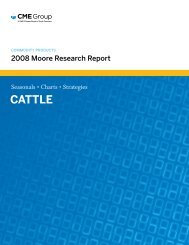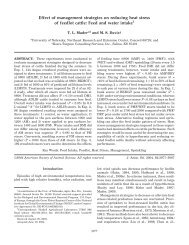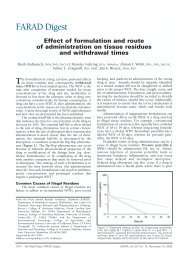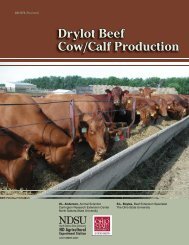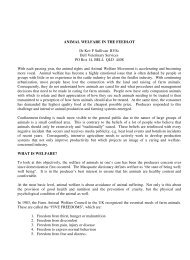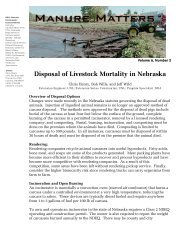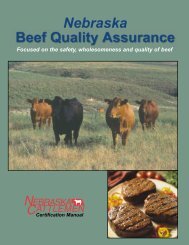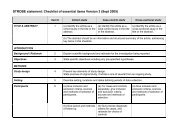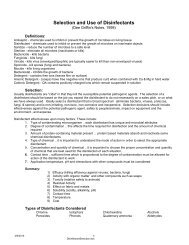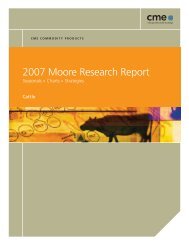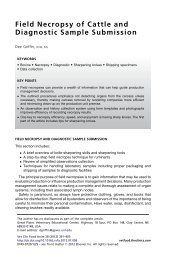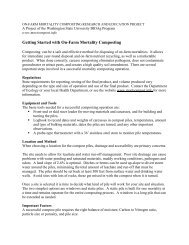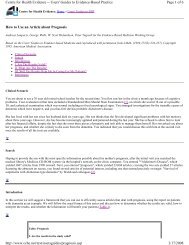CRIMES WITHOUT CONSEQUENCES - gpvec
CRIMES WITHOUT CONSEQUENCES - gpvec
CRIMES WITHOUT CONSEQUENCES - gpvec
You also want an ePaper? Increase the reach of your titles
YUMPU automatically turns print PDFs into web optimized ePapers that Google loves.
state humane slaughter laWs<br />
Indiana 200 and Michigan 201 require that animals killed in accordance with requirements<br />
of a religious faith be cut “immediately following total suspension from the floor.” New<br />
Hampshire 202 and Pennsylvania 203 limit their exemption for religious slaughter until such<br />
a time when acceptable alternatives are available. The language of the Pennsylvania ritual<br />
slaughter exemption follows:<br />
Section 2362(b) Ritual slaughter<br />
Subsection (a) [requiring humane methods] shall not apply to the operator of a<br />
commercial establishment with respect to the positioning and ritual slaughter of cows,<br />
poultry and sheep until one year after the department finds and notifies the operator<br />
that there is available at reasonable cost a ritually acceptable, practicable and humane<br />
method of handling or otherwise preparing conscious calves, poultry and sheep for<br />
slaughter.<br />
7.4 Application<br />
While the federal humane slaughter law covers only slaughter and slaughter and<br />
processing establishments, several states apply their humane slaughter codes to stockyard<br />
operations. 204 However, this application has little practical effect, as animals are not<br />
typically slaughtered for food at stockyards.<br />
Farmers killing animals for their personal use also are not covered under federal law. In<br />
addition, although custom slaughterers are expected to comply with federal food safety<br />
regulations, they are not routinely inspected for compliance. For the most part, state laws<br />
do not provide much additional protection for animals killed for custom or personal use.<br />
Exceptions include Oregon, Utah and Washington, which provide humane slaughter<br />
coverage for custom slaughter; all three states also cover farm (mobile) custom slaughter<br />
operations, which are not expected to comply with federal slaughter regulations. 205<br />
A number of states specifically exempt custom and/or personal slaughter from coverage<br />
under their general food inspection code, their humane slaughter code, or both. For<br />
example, Pennsylvania’s humane slaughter statute does not apply to “a farmer or other<br />
person slaughtering domestic animals owned by the farmer or person.” 206 Arizona law<br />
states, “No person slaughtering or butchering any livestock for his own use shall be<br />
subject to any of the provisions of this article.” 207 Maryland’s humane slaughter statute<br />
does not apply to “a farmer while slaughtering livestock of the farmer.” 208<br />
200 Section 15-2.1-24-13(c).<br />
201 Section 287.554<br />
202 Section 427:33(3)(b).<br />
203 Section 2362(b).<br />
204 States covering the slaughter of animals at stockyards include Arizona, Connecticut, Kansas, Maryland,<br />
Massachusetts, Michigan, Pennsylvania, Rhode Island and Vermont.<br />
205 Under Washington law (Section 16.50.110), “‘Slaughterer’ means any person engaged in the commercial or<br />
custom slaughtering of livestock, including custom farm slaughterers.” Utah law includes humane slaughter<br />
under “Duties of person who holds a farm custom slaughter permit” (Section 4-32-6).<br />
206 Section 2362(c).<br />
207 Section 3-2017B.<br />
208 Section 4-123.1(c)(2).<br />
67




